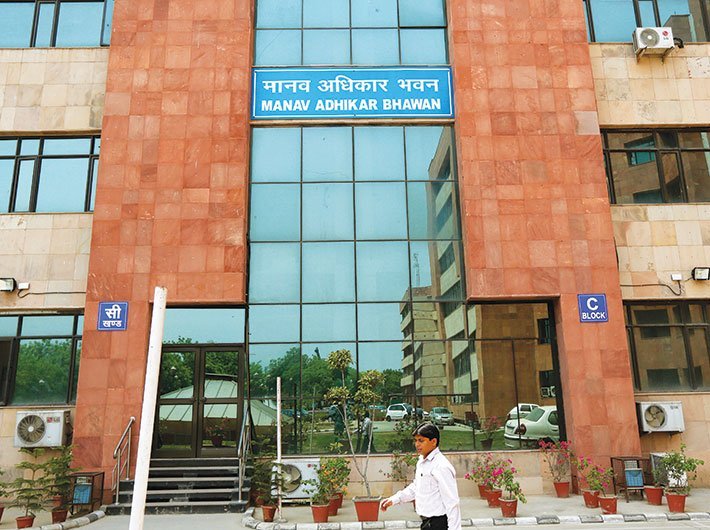Starvation deaths in the KBK districts have been of concern to NHRC since the time that it first took cognizance of the matter in the 1990s
The National Human Rights Commission (NHRC) notes with concern several instances from within Odisha of acquisition of land for various developmental projects without adequate compensation or alternative livelihood support to those displaced from their lands, said panel chief justice HL Dattu in Bhubaneswar.
To add to this, there are disturbing allegations of police brutality against protesting villagers and even journalists covering such protests, said justice Dattu.
He said that starvation deaths in the KBK districts have also been of concern to the commission since the time that it first took cognizance of the matter in the 1990s. The old districts of Koraput, Balangir and Kalahandi (popularly known as KBK districts) have since 1992-93 been divided into eight districts: Koraput, Malkangiri, Nabarangpur, Rayagada, Balangir, Subarnapur, Kalahandi and Nuapada.
Justice Dattu added that in this regard, the commission wishes to underscore that the effective implementation of key socio-economic flagship programmes of the union government are crucial in ensuring the socio-economic well-being of particularly those who grapple with poverty and lack of livelihood opportunities on an everyday basis.
These programmes include the Mahatma Gandhi National Rural Employment Guarantee Act, Integrated Child Development Services, Sarva Shiksha Abhiyan, and Public Distribution System, and the National Rural Health Mission, among several others. To elucidate, the National Rural Employment Guarantee Scheme is a vital programme which must be honestly and adequately implemented, including the provision of unemployment allowance to beneficiaries, especially in cases where the state government fails to provide work.
Read: Amend human rights Act to make NHRC effective: Sathasivam
The NHRC chief said on Monday that in the course of the various visits undertaken by the commission and its special rapporteurs across Odisha, it has been observed that while many positive developments have taken shape, there are several areas in which efforts are required to further improve the situation of human rights within the State.
It has recently come to the attention of the Commission for instance, that in certain areas, such as, Malkangiri district of Odisha, schools lie in a state of abject neglect, with reports suggesting that nearly 72 primary schools in the district have no infrastructure worth the name. This raises serious concerns involving the implementation of the 'Right of Children to Free and Compulsory Education Act, 2009' (RTE Act) and the Sarva Shiksha Abhiyan in the district.
Incidentally, Malkangiri district is also severely affected by left-wing extremism. Among the several factors which have contributed to the persistence of Maoist violence in the district include, the poor socio-economic status of the local population, a majority of who belong to the Scheduled Tribes, and lack of basic facilities such as, education and healthcare.
The Commission notes with concern several instances from within the state of acquisition of land for various developmental projects without adequate compensation or alternative livelihood support to those displaced from their lands.
In the period 2015-2016 (up to December 20, 2016), the commission registered a total of 21,912 cases from the State of Odisha. A number of these cases relate to issues concerning internal displacement, child and bonded labour, implementation and enforcement of the Forest Rights Act 2006, problems faced by farmers and agricultural labourers, trafficking in women and children, and socio-economic backwardness of the KBK districts, among others, said justice Dattu.
He went on to say that the problem of trafficking of women and girls, such as in Sundargarh District are indicative of a problem that is not simply related to lack of effective protection for women and girls, but also aspects of poverty, illiteracy, and lack of adequate livelihood opportunities, which often compel families to relinquish care of their children, including adolescent girls to outsiders, such as unscrupulous employment agencies, agents, and even shelter homes.
The commission has been deeply concerned about the protection of the rights of girls and women, and in this context we would like to know from the authorities regarding the initiatives taken, particularly with respect to human trafficking, missing women and children, dowry deaths, women and child helplines, if any, child marriage as well as efforts towards gender sensitization among police personnel and other public functionaries.
On the important issue of atrocities against members of the Scheduled Castes (SCs), Scheduled Tribes (STs), and other depressed sections of society, it will be important to ascertain what concrete measures the authorities have taken to ameliorate their condition - whether in the context of registration of cases and action taken as per the provisions of the Scheduled Castes and Scheduled Tribes (Prevention of Atrocities) Act, their land and tenancy rights, residential schools for children belonging to SC/ST communities, the overall status of their literacy and education as well as other human rights challenges that confront members of these communities.
Issues concerning prison reforms, custodial justice, condition of juvenile homes, basic sanitation and other facilities in thanas and prisons, delay in submission of compliance reports as well as the issue of the submission of legible copies of reports by state authorities, need to be addressed.
Read: Odisha’s juvenile homes in a poor state: CAG
